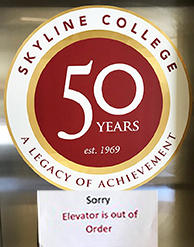December 2019 Advocate: Faculty with disabilities
DISABILITY RIGHTS
Faculty with disabilities: Creating a culture of inclusion
By Lori Slicton, Skyline College, Anthropology
 “Out of Order” read the sign taped to the problematic Bldg. 2 elevator. It remained inoperable for eight weeks. Building 2 houses the pulse of our campus including Admissions and Records, Financial Aid, Transfer Center, Counseling, Health Center, Veteran’s Resource Center, Middle College, among other services. During its inoperation, those who relied on the elevator for safe transport were forced to take the stairs or stay out of the building. The elevator resumed operation September 30, 2019, the day before the Accreditation Site Visit. It has broken since, one time with a disabled person stranded inside.
“Out of Order” read the sign taped to the problematic Bldg. 2 elevator. It remained inoperable for eight weeks. Building 2 houses the pulse of our campus including Admissions and Records, Financial Aid, Transfer Center, Counseling, Health Center, Veteran’s Resource Center, Middle College, among other services. During its inoperation, those who relied on the elevator for safe transport were forced to take the stairs or stay out of the building. The elevator resumed operation September 30, 2019, the day before the Accreditation Site Visit. It has broken since, one time with a disabled person stranded inside.
Nearly thirty years after the signing of the Americans with Disability Act, our District lags behind in implementing crucial policies and procedures. Challenges around a disability, whether temporary or persistent, may impact any of us at any time. If not mitigated, these challenges may jeopardize our employment so we must stay informed of our rights.
I have talked with a number of colleagues who have requested reasonable accommodations and were either under-served or completely denied their accommodations. The glacial pace at which administrators may respond has forced some colleagues to leave the District out of frustration and exhaustion. Meeting the ADA needs of faculty must be a District priority.
To promote a culture of access and inclusion, the following is a proposed series of four actions we can take to support and protect faculty under the Americans with Disabilities Act.
1. Identifying Disabled Faculty Needs
Faculty may feel stigmatized by their disability and may be reluctant to express work challenges to their employer. They may fear retaliation for not meeting their “essential functions.” These are valid concerns and need to be brought out into the light in a spirit of advocacy and mutual support.
In compliance with Human Subject Protocols, data needs to be collected from disabled faculty based on their first-hand work experiences and needs within our District. Confidential faculty interview(s) and or confidential District survey(s) could be utilized with allowances for faculty to write and describe their experiences and needs.
2. Faculty Education: ADA Essentials: What Every Employee Should Know
Workshops conducted by outside community organizations, forums and FLEX activities would be excellent opportunities to become better informed on these issues. Some topics could be:
a) What constitutes a disability?
b) What are essential functions?
c) What is a reasonable accommodation?
d) If I need an accommodation, what do I do?
3. Advocacy
The District should establish an ADA Ombudsperson who would act as a representative to mediate and settle complaints. The creation of a Faculty Disability Resource Center would be an important centerpiece for implementing ADA services. We have wonderful resources for our students but faculty do not have any such resource. Employees need ready access to forms for example: requests for general work accommodations, accessibility/accommodations for meetings, trainings, retreats, FLEX activities among others
The Request for Accommodations needs to be transparent, with published process(es) available on the District website, Employee Handbook and other District media. The administration needs to routinely engage in direct and meaningful consultation with impacted faculty regarding location(s) of offices, classrooms and access to campus services and other relevant ADA needs. The American Anthropological Association (AAA) recently established an Accessibility and Accommodations Coordinator position that oversees accessibility and ADA for their conferences. The AAA webpage includes brief and helpful explanations of terms and resources.
4. Contract Language
Despite the ADA, a federal law, our District has fallen well short of effectively supporting faculty with disabilities. We need to better identify all areas of Unconscious Bias and fully celebrate our diverse faculty. It is imperative that the language in our AFT Union Contract reflect and support Faculty accommodations, advocacy and education under the ADA.
